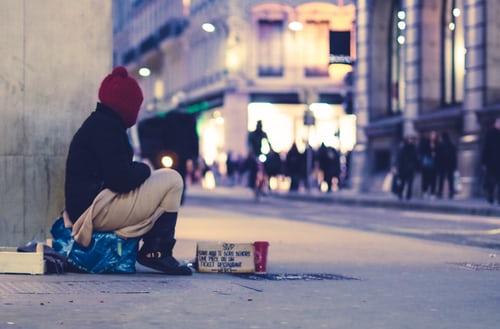Homelessness in the UK is increasing.
The COVID-19 pandemic has had a devastating effect on the jobs market, and more people are in danger of losing their homes in spite of government efforts to prevent people from being evicted.
Then there’s the lack of affordability that causes people to sofa surf, staying at friend’s homes for a few nights before moving on.
Changes to the benefits system have boosted the numbers of those rough sleeping, and cuts in local authority budgets have meant hostels being closed and support services being slashed. There are many reasons why more and more people are finding themselves without a roof over their heads.
The situation is compounded by the fact that three quarters of rough sleepers have problems with mental health, drugs or alcohol, with corresponding support needs.
The causality runs both ways; rough sleepers develop problems due to their circumstances, while those with problems are more likely to find themselves sleeping rough.
What this means is the trauma of homelessness can increase people’s chances of becoming drug or drink dependent, or contribute to mental health problems, and this of course makes it a lot more difficult for a person to get back on track.
Homelessness impacts on communities as well as individuals.
Nobody wants to see people in their city or neighbourhood drinking, begging, or selling their body on the streets, but that’s what can happen and then there’s actual cost of homelessness to the taxpayer which also cannot be ignored.
Research indicates that:
- the average cost of an A&E visit is £147; four out of 10 experiencing homelessness have used A&E in last six month
- £1,668 is the average cost per arrest; seven out of 10 homeless ex-offenders are reconvicted within one year
- £26, 000 is the estimated average cost of a homeless person each year to public purse
- £1 billion is the estimated annual cost of homelessness
Putting in place services which prevent homelessness in the first place, and help people quickly if they find themselves needing support, can contribute to preventing these costs from escalating.
All this evidence points to the fact that ending homelessness is not only beneficial to the people who have moved into housing.
It is beneficial to the community and to the healthcare system as well.
That’s not to say nothing is being done.
The Government has increased funding for local councils as part of its Homelessness Reduction Act and Everyone In policy.
Meanwhile, there are forward-thinking business people such as British entrepreneur and investor, Javad Marandi OBE, and financier Jamie Reuben, who are inspiring a new approach to homelessness.
As the newly- appointed co-chairs of Centrepoint’s Growth Board, they are part of a revolutionary plan to tackle the problem and stop it from spreading.
The growth board is spearheading Centrepoint’s Independent Living Programme (ILP), which is the most important project to be undertaken in the youth homelessness charity’s 50-year history.
It’s a multi-million pound scheme that is the first of its kind anywhere in the world, and is seen as a major innovation in the efforts to curb youth homelessness.
It will enable the most vulnerable young people to build sustainable careers without a simultaneous burden of market housing costs.
The fact is the numbers of young people seeking help from Centrepoint are increasing.
They say that from the start of lockdown to the end of April, a total of 1,314 young people made contact and asked for help, compared with 838 in the same period last year – an increase of 36 per cent.
It is acknowledged that once young people start sleeping rough it becomes harder for them to bounce back.
But through ILP, Centrepoint’s commitment to building 300 homes across London and Greater Manchester aims to change their prospects.
Those aged 16-25, who struggle with or are at risk of homelessness but whose prospects have improved with the help of Centrepoint’s frontline services, will be able to live independently in modern, safe, and affordable homes paying rents that are capped at around a third of their salary.
That means they’ll be able to look forward to a much brighter future, and you can’t put a price on that.

